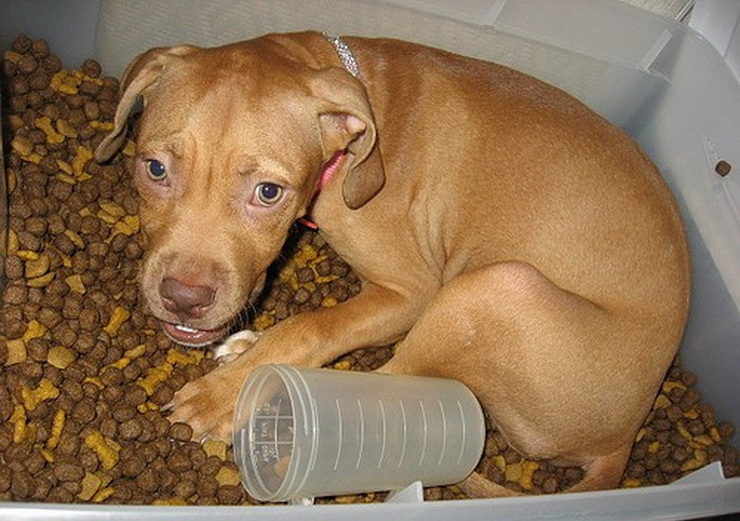Moo: How long should diarrhea last due to a change of food?
I changed my dog's food and now she has diarrhea. I know this is normal due to food change, but how long should it last before I start to worry?
![]()

Photo Credit: EraPhernalia Vintage . . . (playin' hook-y ;o)/Flickr CC
Answers and Views:
Answer by Megan
About a few days or so. It shouldn't take long for her system to get used to the new food. If it's any longer than a week, I'd start worrying & take her to a vet.
Answer by Christie
A lot depends on the food, really. I have a Great Dane pup, and I tried to feed him Eukanuba like my other two dogs that were ok with it. My pup had severe diarrhea, and it didn't stop after deworming and anti-diarrhea pills that the vet had given him. So I tried to switch to grain-free Orijen Six Fish, and it worked. But it was too expensive so I switched again to Taste of the Wild Hi Prairie. I liked it even better!
Now I feed all my three dogs with it, and I want to try their fish kibbles called Pacific Stream. Both foods are for adult dogs but I don't want to feed my Dane some puppy food because he shouldn't grow too fast (it's bad for heavy breeds).
Answer by Paul K.
A sudden change in your dog's food can lead to acute or momentary diarrhea. However, when diarrhea in your dog lasts more than 2-3 days, it may be called chronic diarrhea or chronic colitis. Throughout its duration, the dog must be well hydrated by making him drink because the body can lose a lot of water and mineral salts.
In the vast majority of cases, the cause of dog diarrhea is linked to a dog's diet unsuitable for its biological and natural needs.
So, what you should do now.
In some cases, it is strongly recommended to go to the vet:
Any significant change in the diet of your dog or puppy should be done gradually. This dietary transition should be carried out from three days to one week. Your dog can then adapt to new food and will not exhibit diarrhea.
Answer by Frodd
The two most common causes of diarrhea in dogs are dietary indiscretion and intestinal parasites. Many canine infectious diseases are also associated with acute diarrhea.
Food takes about eight hours to pass through the small intestines. During that time, the bulk of the food and 80 percent of the water is absorbed. The colon concentrates the remainder. At the end, a well-formed stool is evacuated. A normal stool contains no mucus, blood, or undigested food.
With rapid transit through the bowel, food arrives at the rectum in a liquid state, resulting in a loose, unformed bowel movement. This type of rapid transit accounts for the majority of temporary diarrhea in dogs.
Dietary indiscretion is a common cause of rapid transit. Food intolerances can also cause rapid transit. Foods that some dogs seem unable to tolerate can include beef, pork, chicken, horsemeat, fish, eggs, spices, corn, wheat, soy, gravies, salts, spices, fats, and some commercial dog foods.
Also Read:
Answer by Piete
You should always do a SLOW transition to a new food, at least a 6-day transition.
Your dog may have diarrhea for several days. Make sure he drinks lots of water.
Answer by hd112596
A few days. You should really do a slow switch versus just changing over in one day. This is easier on her system.
Answer by meek
If you're switching your dog's food, do it gradually or your dog might get sick or have diarrhea.
Some dogs do not react well to canned dog food. Consider feeding your dog a premium dry food, or a mixture of canned and dry.
Don't give your dog new foods that they have never eaten while you are still treating diarrhea.
Know better? Give your own answer to this question!
We use cookies to offer you a better browsing experience, analyze site traffic, personalize content and ads.